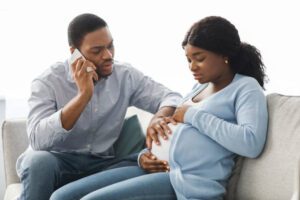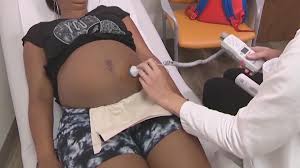Tokophobia is the extreme fear of childbirth. This is not common anxiety or reluctance at the thought of having a baby, which is generally normal. Like a crippling fear of heights or spiders, tokophobia is what is known as a specific phobia, meaning that it is severe enough to interfere with the quality of life.
In some cases, tokophobia can also cause fear of pregnancy or cause sufferers to avoid becoming pregnant (even if they would like to have children).

Types of Tokophobia
There are two different types of tokophobia: primary and secondary.
Primary Tokophobia: Occurs in people who have never given birth before but have tokophobia.
Secondary Tokophobia: Occurs when fear arises from a previous childbirth experience.
Additionally, some people may experience post-traumatic stress disorder (PTSD) after a difficult birth. This may be related to tokophobia but it is not quite the same.
Tokophobia May Stem from other Fears, including:

- Algophobia: Fear of pain.
- Haphephobia: Fear of being touched.
- Iatrophobia: Fear of doctors.
- Nosocomephobia: Fear of hospitals.
- Obesophobia: Fear of gaining weight.
- Pedophobia: Fear of children.
- Thanatophobia: Fear of dying.
- Trypanophobia: Fear of needles.
Symptoms of Tokophobia
Although an intense, psychological fear of childbirth is the biggest characteristic of tokophobia, it isn’t the only one. Many of the symptoms overlap with those of depressive disorders and generalized anxiety disorders, and they can interfere with several aspects of life, from sleep to diet to overall mood.
Common Symptoms of Tokophobia Include:
- Avoidance of intercourse
- Delaying or avoiding pregnancy even though you want to have children.
- Fixation on what could “go wrong” during childbirth, such as maternal or child death or birth defects
- Going to great lengths to avoid getting pregnant (such as doubling or tripling birth control methods)
- Insomnia or nightmares
- Mood swings
- Panic attacks or increase in anxiety symptoms such as fatigue, irrational worry, or headaches
- Requesting a cesarean delivery (c-section) without medical reasons
- Symptoms of depression, such as fatigue, body pain, decreased appetite or libido, or loss of interest in favorite activities
Diagnosis
Like other psychological conditions, tokophobia is diagnosed by a qualified mental health professional, such as a licensed psychologist, psychiatrist, or clinical social worker. In some cases, a primary care physician or even your gynecologist / gynecologist may be able to make the diagnosis based on the symptoms reported.
It may be important to distinguish between tokophobia, PTSD and postpartum depression. All of these can have overlapping symptoms, but may require different approaches to treatment.
Causes of Tokophobia
There isn’t always a clear or obvious reason someone has developed tokophobia. It can be the result of an accumulation of thoughts, fears, experiences and preconceptions about childbirth that develop over the course of a person’s life.
However, there are some factors associated with an increased risk of tokophobia.
Medical Fears
People with primary tokophobia may have greater fears about the medical field in general, including fears of doctors, hospitals, pain or loss of control, and undergoing medical procedures.
They may also have been victims of medical negligence or mistreatment by healthcare professionals and have no confidence in the competence of healthcare professionals. They may also have above-average knowledge of the potential risks and complications of childbirth.
